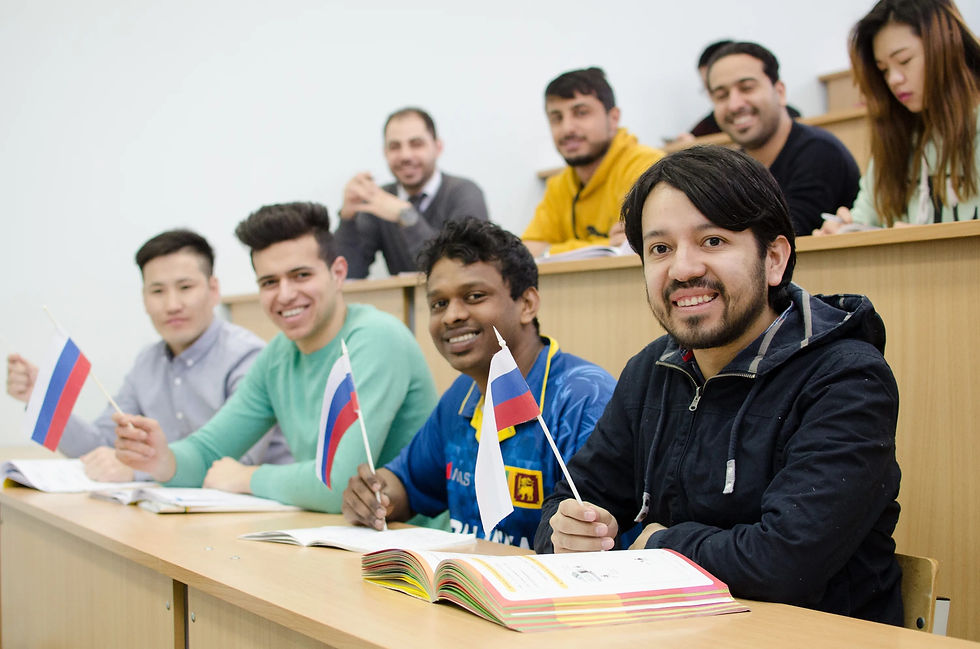Russian language proficiency standards and the TORFL certification system.
- Learn Russian Online

- Jun 23
- 3 min read
Updated: Jun 27

For your information: This document provides a structured overview of Russian language proficiency standards for non-native speakers, aligned with the CEFR framework (A1–C2) and the TORFL certification system.
1. Integrated Assessment Systems
CEFR (Common European Framework of Reference for Languages):
International standard (A1–C2) defining language proficiency levels across reading, writing, listening, and speaking.
TORFL (Test of Russian as a Foreign Language):
The official Russian state certification system, fully aligned with CEFR levels.
2. Level Correspondence
TORFL levels correspond to the Common European Framework of Reference (CEFR) for language learning, teaching, and assessment.
CEFR | TORFL Level | Key Competencies | Academic Hours (45 min.) |
A1 (Breakthrough) | TEU (Elementary) | Basic phrases, simple communication (e.g., introductions, shopping). | 80–100 |
A2 (Waystage) | TBU (Basic) | Everyday communication, understanding short texts (e.g., travel, daily routine). | 180–200 |
B1 (Threshold) | TORFL-I (First) | Discussing familiar topics, writing personal letters, understanding main points in media. | 380–400 |
B2 (Vantage) | TORFL-II (Second) | Professional communication (e.g., technical reports), abstract discussions, nuanced writing. | 720 (380 general + 340 specialized) |
C1 (Effective Operational Proficiency) | TORFL-III (Third) | Academic fluency, analyzing complex texts, persuasive speech in professional contexts. | 280+ after B2 |
C2 (Mastery) | TORFL-IV (Fourth) | Near-native proficiency: literary analysis, cultural nuances, expert discourse. | Variable |
3. TORFL Examination Structure
Passing Requirements:
Minimum passing score per subtest: 66%
Subtests: Listening, Reading, Writing, Speaking, Vocabulary/Grammar (B1–C1)
Format: Task-based simulations of real-life situations (e.g., workplace dialogues for B2; academic presentations for C1).
Accredited Testing Centers:
By Order No. 471 of July 6, 2019, issued by the Ministry of Education and Science of the Russian Federation, 13 educational institutions were included in the list of organizations authorized to conduct testing in Russian as a foreign language (TORFL). These include:
Saint Petersburg State University (SPbSU),
Herzen State Pedagogical University of Russia (RSPU),
Lomonosov Moscow State University (MSU),
Pskov State University,
Peoples' Friendship University of Russia (RUDN University),
Pushkin State Russian Language Institute.
The universities listed in the Order are the sole institutions authorized to administer the TORFL exam. However, some universities have partner organizations in various regions of Russia and abroad. For example, SPbSU has the largest network of partners—approximately 112 organizations across 50 countries.Additionally, SPbSU organizes online TORFL testing sessions, enabling individuals worldwide to take the exam under the supervision of SPbSU specialists.

4. Practical Application by Level
Level Name (English) | Level Code | CEFR | Description & Application |
Elementary Level | TEU | A1 | Certifies basic communicative competence in limited everyday situations. Confirms readiness for further language study. Required for: • Patent (Work Permit for visa-free country citizens) • Work Permit (for visa-required country citizens) • Temporary Residence Permit (TRP) • Permanent Residence Permit (PRP) |
Basic Level | TBU | A2 | Minimum level for obtaining Russian citizenship. Insufficient for university admission (except preparatory faculties). |
First Certification Level | TORFL-I | B1 | Required for service sector employment. Grants eligibility for admission to Russian universities. |
Second Certification Level | TORFL-II | B2 | Permits enrollment in Bachelor's/Master's/PhD programs (excluding Philology). Allows professional work in humanities, engineering, and natural sciences. |
Third Certification Level | TORFL-III | C1 | Qualifies for professional activity in linguistics, translation, journalism, international relations, and management. |
Fourth Certification Level | TORFL-IV | C2 | Near-native proficiency. Mandatory for Master's programs in Philology and all philology-related professions. |
Legal Basis:
Federal Law No. 115-FZ "On the Legal Status of Foreign Citizens in the Russian Federation" (25.07.2002)
Order of the Ministry of Education and Science of Russia No. 1156 (28.08.2014) "On Approval of the Procedure for Examinations in Russian Language, Russian History, and Fundamentals of Russian Legislation"
5. Regulation & Recognition
Developed by: The Ministry of Education of the Russian Federation and the Pushkin State Russian Language Institute.
Regulatory Framework:
GOST R 57605-2017 (Russian National Standard)
Order of the Ministry of Education and Science No. 255 (2014)
International Recognition:
Accredited by ALTE (Association of Language Testers in Europe), recognized by employers and universities worldwide.
Important: All migration-related terms (Patent, Work Permit, TRP, PRP) strictly correspond to definitions within Russian migration legislation. Specified TORFL levels are mandatory for respective legal procedures.






Comments